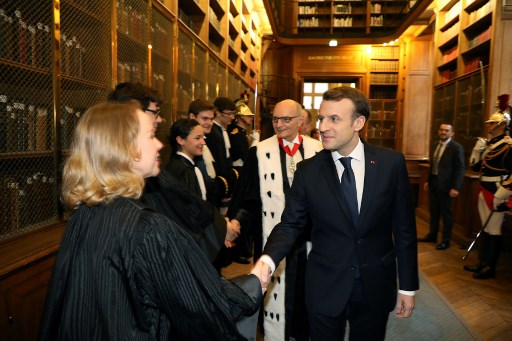
PARIS, France (AFP) – President Emmanuel Macron’s campaign for a “French Renaissance” kicks into overdrive Monday as he welcomes 140 multinational business leaders before this week’s jamboree of the rich and powerful in Davos.
The business-friendly president will host executives at the grand Versailles chateau near Paris for an event billed as a warm-up for Tuesday’s opening of the World Economic Forum in the Swiss mountains.
Several firms will use the conference to announce major French investments, with Facebook revealing early Monday that it will pour an extra 10 million euros ($12.2 million) into its artificial intelligence centre in Paris.
Japan’s Toyota is also due to reveal details of its 400-million euro ($490 million) enlargement of its Onnaing car factory in northern France, with Les Echos newspaper reporting the move will bring 700 new jobs.
A former investment banker, Macron has vowed to shake the French economy out of its torpor.
In his first months in office he pushed through reforms to the country’s famously rigid labour laws and slashed wealth taxes and levies on capital gains.
Economic growth has been forecast to rise to 1.9 percent in 2018 by the central bank, while the government has recently raised its prediction to around 2.0 percent — still below the eurozone average.
A survey by the US Chamber of Commerce and consultancy Bain & Company in November found a record 72 percent of US investors were optimistic about the French economy, a huge hike against 30 percent in 2016.
‘Choose France’
Macron’s predecessors have held similar gatherings of CEOs, but the scale of his “Choose France” conference goes far beyond those hosted by Francois Hollande or Nicolas Sarkozy.
The Socialist Hollande hosted 34 world business leaders in 2014, while rightwinger Sarkozy rolled out the red carpet for 25 in 2011.
“We’ve taken advantage of the fact that economic leaders are coming to Europe by inviting 100 CEOs of the biggest world companies and developing 100 projects with them for France,” a source in the presidency said.
The bosses of Coca-Coca, Google, Siemens and Chinese e-commerce giant Alibaba, and the chief operating officer of Facebook, Sheryl Sandberg, are among those to have taken up the invitation.
While Macron has been given much of the credit for boosting France’s standing on the international stage foreign investment had already begun to pick up before his May 2017 election.
But the investment has so far failed to make a significant difference on the jobs front, with France’s unemployment rate still stuck at 9.7 percent — nearly twice that of Britain or Germany.
In tax terms, France has also benefited little from the presence of tech giants such as Google and Facebook — a bone of contention for Macron, who is pushing for them to contribute more to state coffers.
He will be flanked by 15 ministers at Monday’s conference, which comes the night before leaders from 60 countries and 1,700 businesses start descending on Davos for the world’s most exclusive talking shop.
The French president himself takes to the stage in Davos on Wednesday, where he is set to cut a contrasting figure to that of US President Donald Trump.
While Trump campaigned on an anti-elitist platform that railed against globalisation, Macron has defended globalization, though he will call for a more balanced form of it in his Davos speech.
The 40-year-old centrist has been carving out an active role on the world stage since winning the French presidency last May, and will use his speech to “propose his international vision for the world of tomorrow,” his team said.
The speech will touch on three major challenges, according to Macron’s office: growing inequality, the need for better environmental protection, and global governance in the face of nationalism and extremism.
He is due to speak the same day as German Chancellor Angela Merkel and two days before Trump — although officials have warned that the US government shutdown could scupper the president’s plans to attend.








